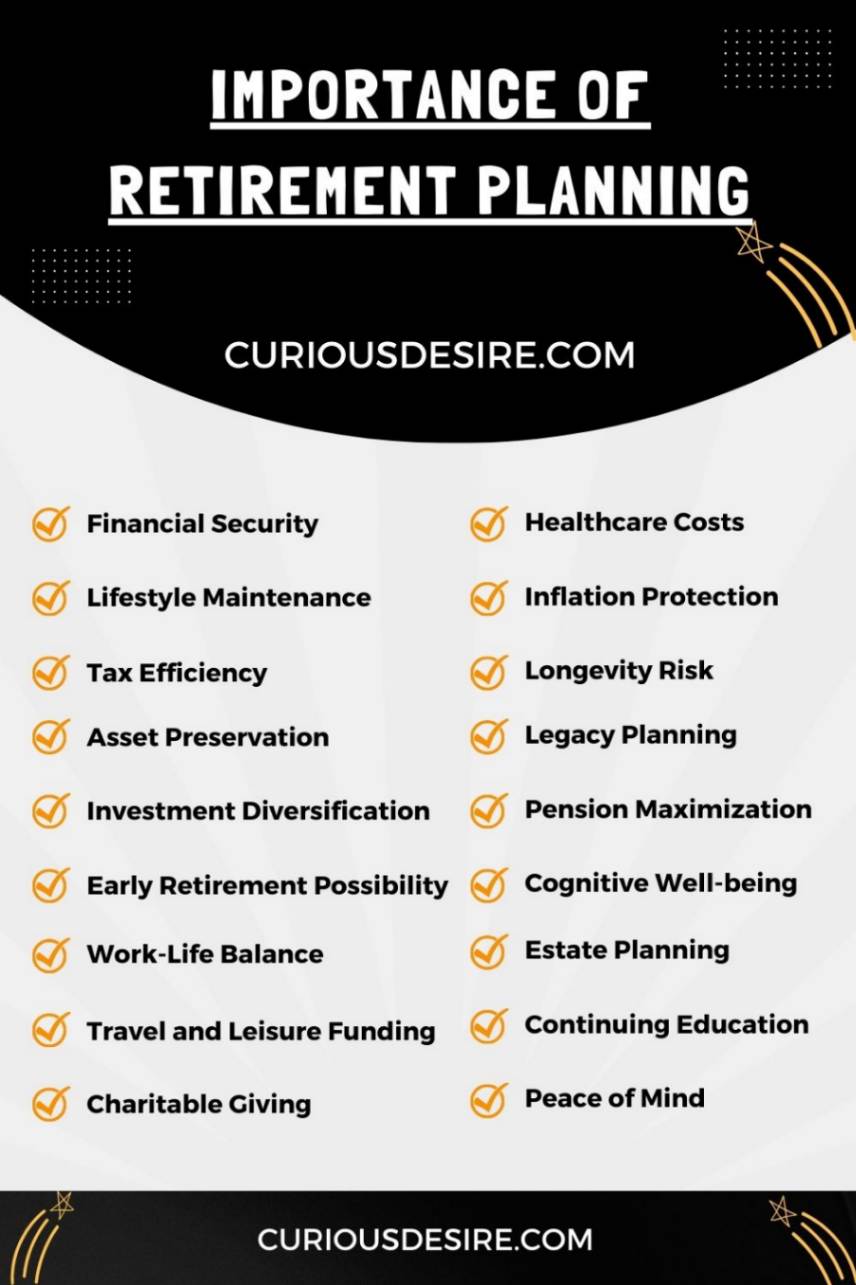Retirement planning is important as it provides individuals with the means to sustain their desired lifestyle and financial stability once they no longer earn a regular income.
By making informed decisions and taking proactive steps to save, invest, and prepare for retirement, people can mitigate risks such as healthcare expenses, inflation, and outliving their savings.
The 20 importance outlined in this article highlights the comprehensive nature of retirement planning, which extends beyond mere financial preparation to involve aspects like estate planning, charitable giving, and ensuring a balance between work and leisure.
By understanding and addressing these facets, individuals can manage retirement with confidence, knowing they have taken proactive steps to secure their future and achieve peace of mind.
Ultimately, retirement planning empowers individuals to enjoy their golden years to the fullest, with the freedom to pursue their passions, support loved ones, and leave a meaningful legacy.
Here are the 5 common reasons for the importance of retirement planning:
- Financial Security
- Healthcare Costs
- Legacy Planning
- Investment Diversification
- Peace of Mind

1. Financial Security
Financial security in retirement is paramount as it ensures that individuals can maintain their quality of life and cover essential expenses once they stop working.
Without adequate retirement planning, individuals risk facing financial hardships during their later years, struggling to afford necessities such as housing, healthcare, and daily living expenses.
By diligently saving and investing in retirement accounts like 401(k)s or IRAs, individuals build a financial safety net that provides peace of mind and stability in retirement.
This financial security allows retirees to enjoy their golden years without worrying about money, pursue hobbies, travel, and spend time with loved ones, enhancing their overall well-being and happiness.
2. Lifestyle Maintenance
Ensuring a consistent lifestyle after retirement is essential because it allows individuals to continue enjoying the activities and comforts they are accustomed to throughout their later years.
By planning and setting aside funds for retirement, individuals can sustain their preferred lifestyle, whether it involves traveling, pursuing hobbies, or spending time with family and friends, without experiencing a significant decline in their standard of living.
Maintaining one’s lifestyle not only contributes to overall happiness and well-being but also helps retirees transition smoothly into this new phase of life with a sense of fulfillment and purpose.
3. Healthcare Costs
As individuals age, healthcare costs tend to increase, making it important to plan for these expenses during retirement.
By factoring in potential medical expenses and securing adequate health insurance coverage, individuals can mitigate the financial burden of healthcare costs and ensure access to quality medical care as they age, maintaining their well-being and peace of mind.
Addressing healthcare costs in retirement planning not only protects individuals’ financial security but also promotes physical and mental health, enabling retirees to enjoy their retirement years to the fullest without undue worry about medical expenses.
4. Inflation Protection
Protecting against inflation is essential in retirement planning to safeguard the purchasing power of savings and investments over time.
Inflation erodes the value of money, making it vital for retirees to invest in assets that offer potential growth and returns that outpace inflation.
By diversifying investments and considering inflation-protected securities, individuals can preserve the real value of their wealth and sustain their purchasing power throughout retirement.
Incorporating inflation protection strategies into retirement planning helps retirees maintain their desired lifestyle and financial security, ensuring that they can afford essential goods and services despite the rising cost of living.
5. Longevity Risk
Longevity risk refers to the possibility of outliving one’s retirement savings, highlighting the importance of planning for an extended lifespan.
With advances in healthcare and improvements in living standards, individuals are living longer than ever before, necessitating careful consideration of longevity risk in retirement planning.
By adopting strategies such as delaying Social Security benefits, annuitizing a portion of savings, or investing in income-generating assets, individuals can mitigate the risk of running out of money in retirement and ensure financial security throughout their extended lifespan.
6 Social Security Optimization
Social Security optimization involves strategically planning when to start receiving Social Security benefits to maximize lifetime income.
By understanding the rules and options available, individuals can make informed decisions about when to begin claiming benefits based on factors such as life expectancy, financial needs, and spousal benefits.
Optimizing Social Security can significantly impact retirement income, ensuring retirees receive the maximum benefits they’re entitled to over their lifetime.
7. Tax Efficiency
Tax efficiency in retirement planning involves minimizing tax liabilities on retirement income and assets.
By strategically managing withdrawals from retirement accounts, utilizing tax-advantaged investment vehicles, and implementing tax-efficient investment strategies, individuals can reduce their tax burden in retirement, allowing them to keep more of their savings and investments.
Tax-efficient planning allows retirees to stretch their retirement dollars further, enhancing their overall financial security and preserving wealth for future generations.
8. Legacy Planning
Legacy planning involves creating a strategy to transfer wealth and assets to future generations or charitable causes.
By establishing wills, trusts, and other estate planning tools, individuals can ensure their assets are distributed according to their wishes and minimize estate taxes and probate costs.
Legacy planning allows retirees to leave a lasting financial legacy for their heirs, supporting their loved ones’ financial well-being and accomplishing philanthropic goals beyond their lifetime.
9. Asset Preservation
Asset preservation focuses on protecting retirement savings and investments from erosion due to market volatility, inflation, and unforeseen expenses.
By diversifying investment portfolios, utilizing risk management strategies, and maintaining an appropriate asset allocation, individuals can mitigate downside risk and preserve capital over the long term.
Asset preservation strategies aim to safeguard retirees’ financial security and provide a stable foundation for funding retirement expenses, regardless of market conditions.

10. Investment Diversification
Investment diversification involves spreading investment assets across different asset classes, industries, and geographic regions to reduce risk and optimize returns.
By diversifying portfolios, individuals can mitigate the impact of market fluctuations on their investment performance and improve the risk-adjusted return potential.
Diversification also helps retirees achieve their long-term financial goals while minimizing the likelihood of significant losses, providing a more stable and reliable source of income in retirement.
11. Emergency Fund Preparation
Building an emergency fund is vital for unexpected expenses or financial hardships that may arise during retirement.
By setting aside a portion of savings in a liquid and easily accessible account, individuals can cover unforeseen costs such as medical emergencies, home repairs, or job loss without jeopardizing their long-term financial security.
An emergency fund provides peace of mind and financial resilience, allowing retirees to navigate challenging situations with confidence and stability.
12. Early Retirement Possibility
Planning for early retirement involves assessing financial readiness and exploring strategies to retire before the traditional retirement age.
By maximizing savings, optimizing investment returns, and minimizing expenses, individuals can accumulate sufficient assets to retire early and pursue their desired lifestyle.
Early retirement offers the opportunity to enjoy more leisure time, pursue personal interests, and spend quality time with loved ones, enhancing overall happiness and fulfillment in retirement.

13. Pension Maximization
Maximizing pension benefits involves understanding pension plan options and choosing the most advantageous payout strategy.
By considering factors such as life expectancy, spousal benefits, and inflation protection, individuals can optimize their pension income to provide long-term financial security.
Pension maximization strategies may involve selecting a joint-and-survivor annuity, purchasing life insurance, or utilizing pension buyout options to enhance retirement income and provide for loved ones after retirement.
14. Cognitive Well-being
Cognitive well-being in retirement involves maintaining mental acuity, emotional resilience, and overall brain health.
By engaging in activities that stimulate the mind, such as reading, puzzles, social interactions, and lifelong learning, individuals can preserve cognitive function and reduce the risk of cognitive decline in later years.
Cognitive well-being promotes a sense of fulfillment, independence, and purpose in retirement, contributing to overall happiness and quality of life.
15. Work-Life Balance
Achieving work-life balance in retirement involves finding a harmonious blend of leisure, personal interests, and meaningful activities.
By prioritizing activities that bring joy, fulfillment, and a sense of purpose, retirees can create a balanced lifestyle that enhances well-being and satisfaction in retirement.
Work-life balance allows individuals to enjoy the benefits of retirement while pursuing hobbies, volunteering, traveling, or spending time with family and friends, promoting a sense of fulfillment and contentment in this new phase of life.
18. Estate Planning
Estate planning involves creating a comprehensive strategy to manage assets during life and after death, ensuring they are distributed according to one’s wishes.
It includes wills, trusts, and directives for healthcare and finances, minimizing taxes and avoiding family disputes.
By outlining intentions clearly, it provides peace of mind and security for loved ones, safeguarding vulnerable family members and leaving a lasting legacy.
17. Travel and Leisure Funding
Travel and leisure funding is an integral aspect of retirement planning that allows individuals to enjoy their newfound freedom and pursue their passions.
By budgeting and saving specifically for travel and leisure activities, retirees can explore new destinations, indulge in hobbies, and create lasting memories with loved ones.
Allocating funds for travel and leisure ensures that retirees can fulfill their lifelong dreams and aspirations, whether it’s embarking on a world tour, taking a cruise, or simply relaxing at a beach resort.
Additionally, travel and leisure experiences contribute to overall well-being by providing opportunities for relaxation, adventure, and personal growth, enriching retirement years with meaningful experiences and fulfilling adventures.

18. Continuing Education
Continuing education in retirement offers numerous benefits beyond intellectual stimulation; it promotes personal growth and enhances cognitive function and overall well-being.
By enrolling in classes, and workshops, or pursuing lifelong learning opportunities, retirees can stay mentally sharp, expand their knowledge base, and explore new interests.
Continuing education also provides social connections and networking opportunities, allowing individuals to engage with like-minded peers and participate in stimulating discussions and activities.
Whether it’s learning a new language, mastering a musical instrument, or exploring art history, continuing education enriches retirement years with purpose, fulfillment, and a sense of accomplishment, contributing to a fulfilling and meaningful retirement experience.
19. Charitable Giving
Charitable giving in retirement allows individuals to make a positive impact on their communities and support causes that are meaningful to them.
By donating time, resources, or assets to charitable organizations, retirees can leave a lasting legacy and create a meaningful impact beyond their lifetime.
Charitable giving not only benefits the recipients but also provides personal satisfaction, fulfillment, and a sense of purpose.
Whether it’s supporting local charities, volunteering for community projects, or establishing a charitable foundation, retirees can make a difference in the lives of others and leave behind a legacy of compassion, generosity, and altruism.
20. Peace of Mind
Achieving peace of mind in retirement involves more than just financial security; it involves emotional well-being, fulfillment, and contentment in this new phase of life.
By addressing financial concerns, establishing a clear plan for the future, and nurturing social connections and personal interests, retirees can cultivate a sense of peace and tranquility.
Peace of mind allows individuals to embrace retirement with confidence, knowing that they have the resources and support to navigate life’s challenges and enjoy the opportunities that lie ahead.
It provides a sense of security, fulfillment, and optimism, allowing retirees to savor each moment and embrace the possibilities of this new chapter with open arms.
Conclusion
In conclusion, retirement planning is not just about setting aside money for the future; it’s a comprehensive strategy that involves various aspects important for a fulfilling and secure retirement.
From ensuring financial security and maintaining lifestyle preferences to managing healthcare costs, optimizing Social Security benefits, and leaving a legacy, retirement planning plays a vital role in shaping one’s golden years.
By considering the 20 important factors discussed in this article, individuals can make informed decisions, navigate potential challenges, and enjoy a retirement filled with joy, purpose, and peace of mind.
Through careful preparation and proactive steps, retirement can truly be a rewarding chapter in life, allowing individuals to embrace new opportunities, pursue personal interests, and cherish the moments with loved ones, knowing they have planned wisely for the future.
Importance of Retirement Planning FAQs
1. Why is it important to start retirement planning early?
Starting early allows for more time to save and invest, increasing the likelihood of achieving financial security in retirement.
2. What role does Social Security play in retirement planning?
Social Security provides a source of income in retirement, but optimizing benefits and supplementing with personal savings is essential for a comfortable retirement.
3. How can individuals protect their retirement savings from inflation?
Diversifying investments, including inflation-protected securities, helps preserve the purchasing power of savings over time, safeguarding against the effects of inflation.
4. Why should retirees consider healthcare costs in their retirement plans?
Healthcare expenses tend to increase with age, so budgeting for medical care ensures retirees can maintain their well-being without depleting their savings.
5. What are some strategies for maximizing retirement income?
Delaying Social Security benefits, utilizing employer-sponsored retirement plans, and investing in income-generating assets are effective ways to maximize retirement income.
6. How can individuals ensure their assets are distributed according to their wishes after they pass away?
Estate planning, including wills and trusts, allows individuals to specify how their assets should be distributed and minimize estate taxes and family disputes.
7. What steps can individuals take to maintain a balanced lifestyle in retirement?
Prioritizing leisure activities, hobbies, and social connections alongside financial planning ensures retirees enjoy a fulfilling and well-rounded retirement experience.
8. How does retirement planning contribute to overall peace of mind?
Retirement planning provides a clear roadmap for the future, reducing financial worries and allowing retirees to focus on enjoying their retirement years with confidence and security.